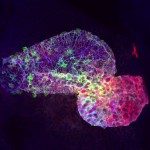Lien vers Pubmed [PMID] – 26524590
Lien vers HAL – pasteur-01662502
Lien DOI – 10.1172/JCI82424
Journal of Clinical Investigation, 2015, 125 (11), pp.4171 - 4185. ⟨10.1172/JCI82424⟩
Mucosal-associated invariant T cells (MAITs) have potent antimicrobial activity and are abundant in humans (5%-10% in blood). Despite strong evolutionary conservation of the invariant TCR-α chain and restricting molecule MR1, this population is rare in laboratory mouse strains (≈0.1% in lymphoid organs), and lack of an appropriate mouse model has hampered the study of MAIT biology. Herein, we show that MAITs are 20 times more frequent in clean wild-derived inbred CAST/EiJ mice than in C57BL/6J mice. Increased MAIT frequency was linked to one CAST genetic trait that mapped to the TCR-α locus and led to higher usage of the distal Vα segments, including Vα19. We generated a MAIThi congenic strain that was then crossed to a transgenic Rorcgt-GFP reporter strain. Using this tool, we characterized polyclonal mouse MAITs as memory (CD44+) CD4-CD8lo/neg T cells with tissue-homing properties (CCR6+CCR7-). Similar to human MAITs, mouse MAITs expressed the cytokine receptors IL-7R, IL-18Rα, and IL-12Rβ and the transcription factors promyelocytic leukemia zinc finger (PLZF) and RAR-related orphan receptor γ (RORγt). Mouse MAITs produced Th1/2/17 cytokines upon TCR stimulation and recognized a bacterial compound in an MR1-dependent manner. During experimental urinary tract infection, MAITs migrated to the bladder and decreased bacterial load. Our study demonstrates that the MAIThi congenic strain allows phenotypic and functional characterization of naturally occurring mouse MAITs in health and disease.





